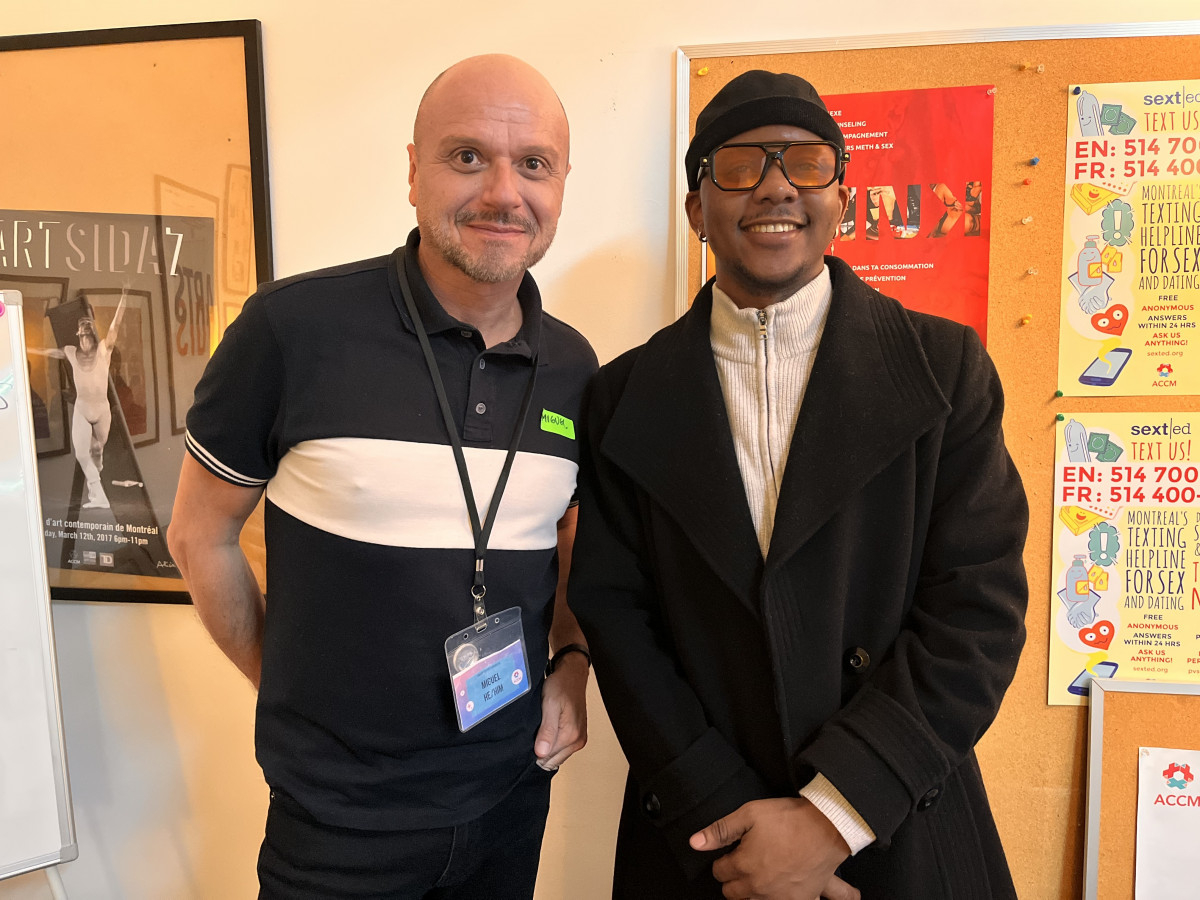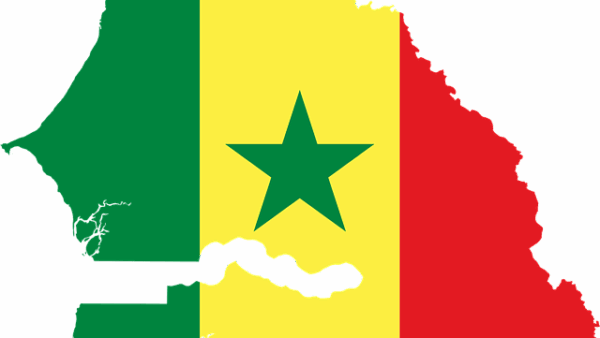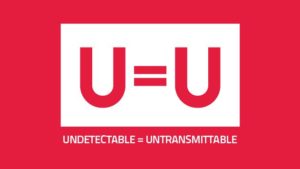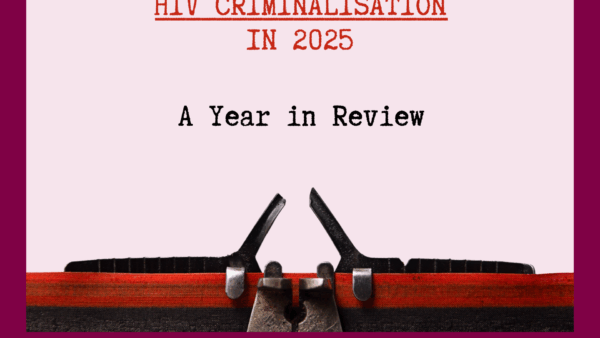
A path to new beginnings: migrants with HIV
Montreal’s only anglophone HIV/AIDS care centre supports newcomers beyond healthcare.
Colombian immigrant Ferney Mendoza sits in a warmly lit room watching a PowerPoint presentation at Montreal’s only anglophone and allophone HIV/AIDS support centre.
He is joined by four other newcomers on a ring of couches, with a spread of snacks in the centre.
The workshop is part of a three-month program designed to help migrants living with HIV navigate their integration into the province.
On the screen, Quebec is highlighted on a map of Canada and labelled with a bold “14 per cent”—the province’s minimum tax rate. Today’s topic: how to file taxes.
For many newcomers with HIV, immigrating to a new country isn’t just about accessing medication. For Mendoza, workshops like this one—focused on understanding tax rules in Canada—helped him stabilize his income and better support his three children.
The aptly named “New Horizons” workshop series is hosted by AIDS Community Care Montreal (ACCM). The five-year-old program was initially geared towards Spanish-speaking immigrants with HIV, but has expanded in recent years to meet the changes in Canada’s immigrant population.
Organizers at ACCM say that supporting successful integration has become increasingly important as more newcomers are being diagnosed with HIV.
The latest federal data reveals that over 2,000 migrants tested positive for HIV in 2022, an increase of close to 145 per cent within a single year.
In Quebec, the number of new recorded HIV cases in 2022 grew by over 75 per cent compared to the previous year. According to the Institut national de santé publique du Québec, the rise in cases is linkedto an overall increase in the number of migrants arriving in the province.
More than just healthcare
Mendoza came to Montreal in 2021 with his family after fleeing Colombia. Their safety was threatened due to discrimination against their transgender son and Mendoza’s own fears of being persecuted for living with HIV.
Migrants with HIV, he said, are at the intersection of multiple obstacles. Navigating an entirely new healthcare system is only one part of the challenge—having access to support for social and cultural integration is just as important.
“Human beings are dimensions: emotions, family, work and money,” he said. “[ACCM] really took me as a whole individual.”
Many migrants with HIV receive their diagnoses upon their arrival in Canada as part of a mandatory medical screening process required to obtain a working visa.
Jabulani Muzhizhizhi, ACCM newcomers support program coordinator, said that some migrants can feel alienated from their own cultural backgrounds after being diagnosed as HIV-positive. This is especially prevalent for those immigrating from countries where queerness is stigmatized or where toxic masculinity is the norm.
The New Horizons program, Muzhizhizhi said, aims to offer newcomers a sense of community during a time when living with HIV can feel especially isolating.
Roundtable discussions are a regular feature at these workshops. Topics like “migration stories” and “celebrating cultural traditions” are highlighted in the first weeks of the program to remind participants that they’re not alone.
“There is power in sharing,” Muzhizhizhi said. “If you know someone also faced the same stuff that you faced—that’s how bonds form.”
Prejudice was the first thing Mendoza was able to let go of after participating in ACCM’s workshops.
He explained that in Colombia, individuals living with HIV can become the target of attacks, particularly from extremist groups who unjustly perceive them as deliberately spreading HIV.
However, Mendoza said that the support of ACCM gave him the space to release the feelings of stigma that had previously been buried beneath the surface.
“I was finally able to expose that here,” he said, “and I felt safe that nothing was going to happen to me.”
Overcoming language barriers
As the only non-francophone HIV/AIDS care centre in Montreal, support services department manager Miguel Cubillos said that ACCM faces a distinct responsibility to offer a comprehensive range of services.
Their staff is not only equipped to provide emotional support and guidance through the healthcare system, but they also assist with the immigration process by accompanying newcomers to immigration hearings or connecting them with legal support.
According to Cubillos, language is often a barrier that stands between a newcomer with HIV and access to medical documents, treatment options and education about HIV-positive prevention.
“We have a high responsibility with the population we serve because we are a minority,” Cubillos said, referring to the fact that many participants in the newcomers program are not native French nor English speakers.
For Israel Mohamed Conteh, a court reporter from Sierra Leone who fled to Canada after receiving threats over his journalism, ACCM became “one of the greatest pillars of support.” Being diagnosed as HIV-positive upon his arrival, Conteh turned to the organization for help, particularly in accessing French language courses essential for finding employment.
Since arriving in Montreal in 2024, Conteh financially supports his wife and child, who live in Guinea.
A former scout, Conteh does not back down from challenges. Despite facing numerous obstacles on his path to fluency in French, he refuses to seek work in an English-speaking province.
He views his time in Quebec as a chance to fulfill a lifelong goal.
“God brought me to Quebec for a particular reason,” Conteh said with a characteristic smile. “That reason? All my life, I’ve been among people that speak French.”
While living in Sierra Leone, Conteh worked as a COVID-19 and Ebola support counsellor, helping people navigate their next steps after receiving a diagnosis. Now, as he begins a new chapter in Canada, he believes he must “counsel himself” through his own diagnosis—this time, with the support and guidance of ACCM.
“You must live with [HIV] for eternity,” he said. “But once you accept it and take your medication, it will help you greatly.”
Delays and costs in medical care
Many migrants, whether diagnosed with HIV upon arrival or aware of their status before coming, face delays in being connected to care.
Isabelle Boucoiran, a researcher and OB/GYN at CHU Sainte-Justine who specializes in caring for pregnant women living with HIV, says that some of her patients have had to wait up to one month before being referred to a specialist.
Delays like that, she said, can be the difference between preventing or allowing vertical transmission—the passing of HIV from mother to child.
“For newcomers, when they arrive in Canada, there is so much going on,” Boucoiran said. “When you are struggling to find a place to live, doing your test is not your priority at all.”
At ACCM, much of the work revolves around being the on-ramp to care. Last year alone, Cubillos said that the organization supported 110 clients through its newcomers program, many of whom needed to connect to an HIV clinic.
While HIV medication for refugee claimants is completely covered by the Interim Federal Health Program, newcomers with HIV coming to Canada under a working visa can struggle to find employment that covers treatment under insurance.
With data from 225 pregnancies from 2019-2023, across CHU Sainte-Justine, CHU de Quebec-Laval and CUSM, Boucoiran said that the median out-of-pocket cost for antiretrovirals during pregnancy before insurance was around $2,300 for non-permanent residents. This is over four times the amount paid by Canadian citizens or permanent residents, she added.
Some of Boucoiran’s patients, particularly women from African countries where antiretrovirals are free, arrive in Canada with six to nine months’ worth of medication, anticipating the difficulties in accessing medication once they arrive.
For migrants who arrive without health or insurance coverage, ACCM partners with pharmaceutical companies like Gilead through compassion programs to provide opportunities to obtain at least six months of medication.
While community organizations like ACCM cannot substitute themselves for formal medical care and rapid linkage to an HIV specialist, they play an important role in bridging the gap during the first years of settlement.
Despite recent provincial cuts to English-service community resources, particularly those related to employment support, ACCM’s newcomers’ program received an increase in allocated funds from the Direction régionale de santé publique in March. The new budget increase was granted following the latest data on HIV rates among Canadian migrants.
With the funding increase running until 2027, Cubillos believes the program will be better positioned to serve youth migrants with HIV, who make up a large proportion of HIV-positive newcomers.
The organization also hopes to one day have enough resources to tackle migrant food insecurity and expand its food bank through partnerships with grocery stores and restaurants.
Cubillos said that challenges for migrants with HIV will only continue to evolve. However, he said that ACCM staff remain committed to adapting the program as needed, based on the shifting experiences of their members.
“The best reward,” Cubillos said, “is seeing members establish themselves and say: ‘Okay, now I’m here. The limbo situation is gone and I’m flourishing in the country.’”









